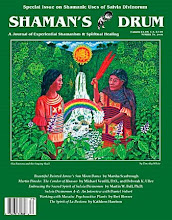Before we leave the ice age to further explore contemporary American shamanism let me say a word about contemporary shamanism as it relates to Native American traditions. According to the website, New Age Frauds and Plastic Shamans, created by an activist group of Native Americans and their supporters “No traditional Native American or First Nations group calls their spiritual teachers, leaders or elders "shamans", which is a term native only to Siberia.” And, “Contemporary, New Age, "global" shamanism is characterized by cultural appropriation, eclecticism and personal spiritual connections.” *
Cultural appropriation when employed by a would-be shaman is legitimately viewed with skepticism. Considering the context of our blood soaked history it is easy to see why Native Americans take offense when they see non-natives blithely adopt the outward trappings of sacred native traditions. This is true especially when commercial gain or fraud is involved.
That is not to say a person of European descent cannot successfully undertake training in a Native American tradition. Nor is it to say that just because someone is of Native American heritage they are automatically qualified to teach tribal traditions. However, out of respect for traditional native American spiritual practices we should not confuse them with contemporary "global" shamanism.
* Since posting this I have noticed a few respected Native American voices using the term shaman in relation to Native spiritual tradition, The respected author and historian Vine Deloria Jr. in The World We Used to Live In and activist, poet and visionary John Trudell on his album AKA Graffitti Man in the song Shaman (Make a Chant). I believe the key to the complaint is not so much use of the word shaman but is about having respect for the traditions of others.
Cultural appropriation when employed by a would-be shaman is legitimately viewed with skepticism. Considering the context of our blood soaked history it is easy to see why Native Americans take offense when they see non-natives blithely adopt the outward trappings of sacred native traditions. This is true especially when commercial gain or fraud is involved.
That is not to say a person of European descent cannot successfully undertake training in a Native American tradition. Nor is it to say that just because someone is of Native American heritage they are automatically qualified to teach tribal traditions. However, out of respect for traditional native American spiritual practices we should not confuse them with contemporary "global" shamanism.
* Since posting this I have noticed a few respected Native American voices using the term shaman in relation to Native spiritual tradition, The respected author and historian Vine Deloria Jr. in The World We Used to Live In and activist, poet and visionary John Trudell on his album AKA Graffitti Man in the song Shaman (Make a Chant). I believe the key to the complaint is not so much use of the word shaman but is about having respect for the traditions of others.








